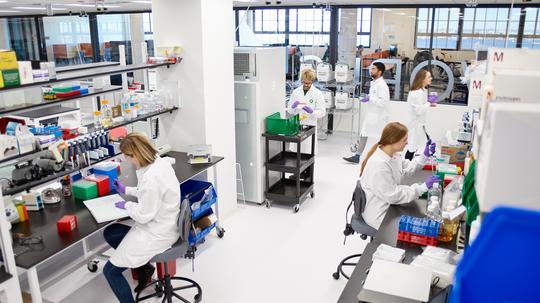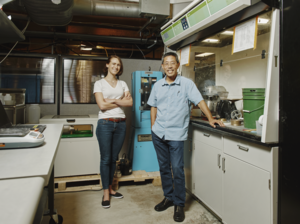
Chew on this: Motif, a startup that's a subsidiary of biotechnology major Ginkgo Bioworks, launched today with $90 million Series A in its pocket to make alternative proteins.
The investment was led by billionaire-backed Breakthrough Energy Ventures that is committed to fighting climate change and Viking Global Investors; Connecticut-based Viking Global Investors was an early investor in Impossible Foods. Louis Dreyfus Companies and Fonterra also participated in the round.
Motif will be run by Jonathan McIntyre as the CEO; McIntyre comes from PepsiCo, where he headed research for the company's global snacks category and most recently headed R&D for Charlestown-based agricultural tech company, Indigo AG.
"At Pepsi, I was responsible for formulating products. So I know the whole pathway of coming up with an ingredient," McIntyre said.
Motif will work on a B2B model, making alternative proteins to sell to food companies and product developers as an ingredient.
"Food companies can tell us what kind of protein properties/specific protein types and we can make them," McIntyre said. "We're making meat replacement that looks and tastes like chicken."
The company will use the Ginkgo Bioworks platform to produce food protein through fermentation. It works like this: Motif will use parent company Ginkgo Bioworks' technology to understand the genetics or genome sequence of a particular protein, synthesize that sequence and manufacture it and place it in yeast or other microbes and grow them in a tank through fermentation.
"We have the ability to identify all the proteins in egg and recreate them. What Motif will provide is food science expertise and use Ginkgo Bioworks' platform for being able to identify and make proteins for early scale," McIntyre said. "We can look at the genome of all edible plants and we can make the genes, stick them in the yeast and reproduce them."
This process, McIntyre added, can be used to make animal protein too.
When asked about what trends he portends for the food industry, McIntyre said, "The food industry and agricultural industry are recognizing that consumers have a broad set of desires, along with preferences for how the food is made. Enabling nutrition, enabling plant protein without comprising taste are trends growing pretty fast."
According to market research firm Nielsen, the market for plant-based meat substitutes products grew 17 percent between 2017 and 2018, reaching over $3.7 billion in the U.S.
It should come as no surprise then that Impossible Foods, the company behind the Impossible Burger, raised $114 million from leading investors including Bill Gates, Google Ventures and UBS. The company founded in 2011 by Stanford biochemistry professor and former pediatrician Dr. Patrick O. Brown claims that it's vegan burger is indistinguishable from animal meat, so much so that it can even bleed. Impossible Foods is now taking its meatless burger to Asia, with its latest expansion to Singapore.
As for Ginkgo Bioworks, this is not the first time the biotech unicorn has spun off a company. It launched Joyn Bio, a joint venture with Bayer Crop Science to develop plant probiotics and fertilizers.








